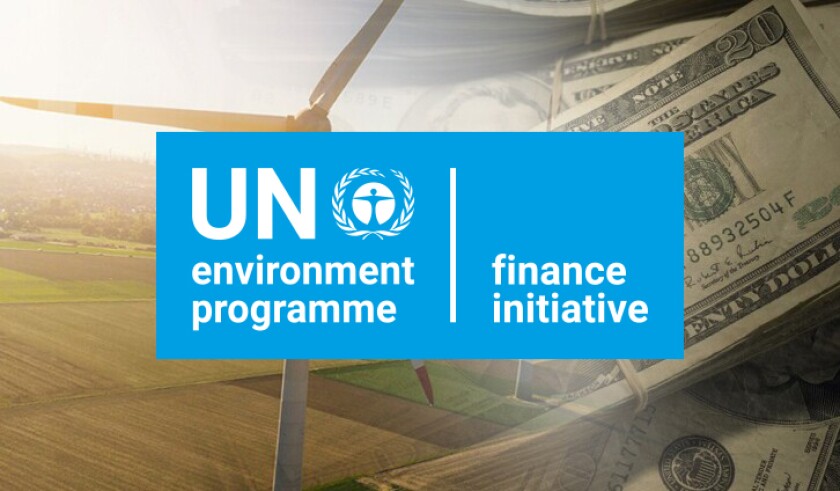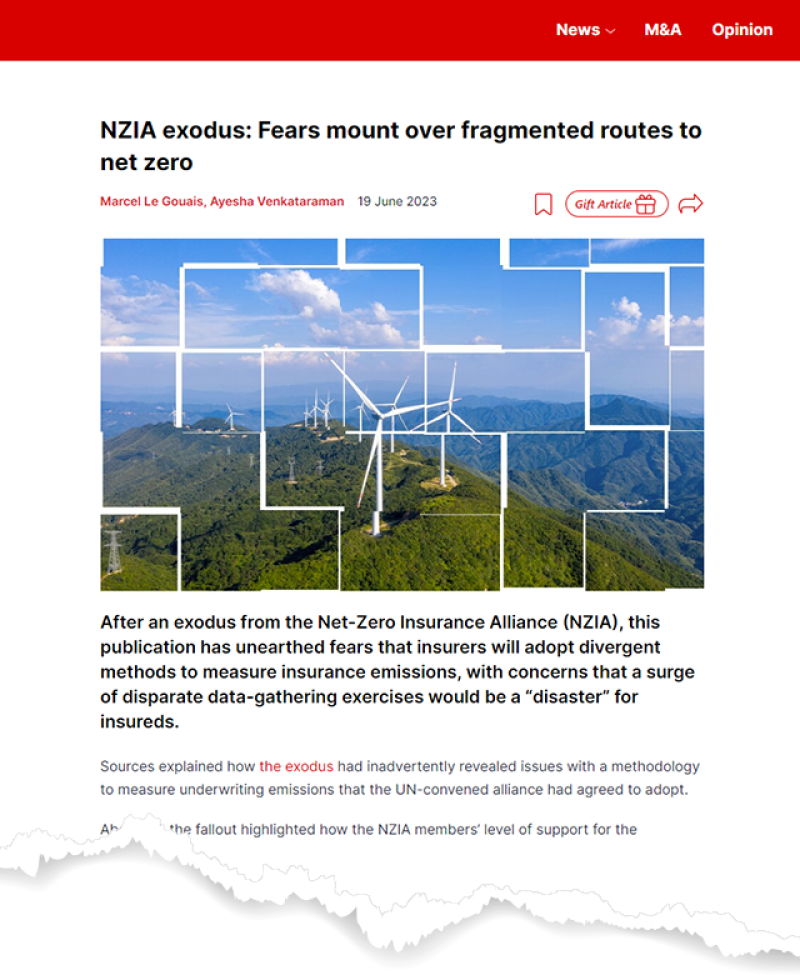
In the middle of last year, the Net-Zero Insurance Alliance (NZIA) was thrust into the spotlight as a slew of insurers, some founding members, announced their exits under pressure of new anti-ESG threats and regulatory action.
Founding member Munich Re was the first to depart, citing anti-trust concerns, followed by a quick unravelling of the alliance as other insurers fled including Allianz, Aviva, Axa, Scor, Swiss Re and Zurich.
At last tally, only 11 of the 30 members remained, and the alliance lay fallow until it was quietly discontinued last week with the announcement of a new and improved net zero forum in its stead.
The Forum for Insurance Transition to Net Zero (FIT), created by the United Nations Environment Programme (UNEP), claims it will take into account the experience gained with the NZIA such that it bears notable differences, which make it far more than an exercise in rebranding.
Sources within the industry said that it was “great news” that a respected body was going to continue the work of defining the standards and frameworks, which was otherwise “up in the air” and called the forum a “very different animal” with a “different speed and a bit of a different drive”.
There are five reasons FIT is likely to be better able to navigate the missteps of its predecessor.
1. FIT is a multistakeholder forum with a diversity of perspectives missing from NZIA.
The NZIA was fashioned to include insurers, reinsurers, brokers and insurance market bodies, which made sense at the time given its purpose to provide a roadmap for the industry to transition to net zero.
Speaking to Insurance Insider, Butch Bacani, UNEP head of insurance and chair of FIT, credited the NZIA with creating the foundational work needed to transform net zero insurance theory into practise.
But he added as part of UNEP’s ongoing engagement with key stakeholders, they concluded that many key stakeholders who also play a key role needed a space to be involved in this agenda, which led to a multistakeholder approach for FIT.
FIT has, therefore, adopted a comprehensive multi-stakeholder structure which, in addition to the 16 founding FIT participants (including (re)insurers such as Beazley, Generali and Aviva), will seek input on its activities from two separate consultative groups that are independent of each other – one group made up of insurance regulatory and supervisory authorities; the other group made up of academic, research and civil society organisations.
Of particular importance, is the inclusion of regulators to this forum, which have been drawn from a diverse array of countries including Australia, Brazil, Italy, Kenya, UK, Singapore and three from the US with California, Illinois and Washington State regulators in the mix.
Sander Biesma, CEO of NN Re, the reinsurance arm of Netherlands-based NN Group, which is a member of FIT said “very pleased that so many regulators have decided to join,” which was a perspective he felt was “lacking during the discussion last year with the US state attorney generals”.
The forum also makes room for scientific perspective with a consultative group comprising academic and civil society organizations. “Our belief is that climate action needs to be accelerated and scaled up across the board,” said Bacani.
By giving everyone a seat at the table, FIT’s new structure eschews the navel gazing by the insurance sector alone that was a characteristic of the NZIA.
2. FIT has a legal team to advise on key issues, which is particularly necessary given the anti-ESG backlash in some US states.
Last year saw an increasingly litigious anti-ESG movement in some US states, and various concerns around the anti-trust implications of the NZIA were raised.
In March, a group of 21 Republican state attorneys published an open letter to more than 50 of the largest US asset managers, warning them of potential violations of antitrust laws due to their participation in green investor alliances.
The letter also warned that “several insurers face climate proposals that push for unlawful alterations of underwriting activities in order to achieve the ESG goal of aligning insurance underwriting with net zero by 2050”.
In its response to these growing pressures, FIT has assembled a legal team from three global law firms with expertise in antitrust and competition laws, sustainability, insurance and finance.
This team should better enable the new forum to anticipate and get in front of legal issues before they write the narrative for the sector.

3. The forum will have wider scope of focus with longer timelines.
Bacani explained a key feature of the forum would be working towards advancing frameworks for net-zero insurance metrics and targets while also developing new net zero insurance concepts.
While the NZIA laid important foundations for insured emissions accounting and target setting methods for underwriting portfolios, the FIT will expand the scope of that to new lines of business including claims management which is “very unique to insurers in reducing emissions and promoting a circular economy,” according to Bacani.
“Most stakeholders associate net-zero insurance with property and casualty insurers. We believe that life and health underwriting portfolios also have a key role to play in the net zero transition and we can go on to other areas like what is the role of brokers in the net zero transition as well,” he added.
The forum will also help insurers better understand the insurance needs of the economy to support the development of net-zero transition plans by corporates across different sectors.
There's no way that we're going to make a net-zero world of risk transfer without engaging all these parts
It will also depart from the traditionally requested information from hazard exposure and vulnerability information to greenhouse gas emissions profiles of corporates.
One source felt confident this would go further than the NZIA because of its more realistic focus. They said: “There's no way that we're going to make a net-zero world of risk transfer without engaging all these parts.”
Sources also added that the NZIA had been very ambitious, in relation to its tight timelines. In a span of less than a year, there were three major outputs by NZIA, namely a white paper on net zero insurance, the insured emissions accounting standard and the best practise target-setting guide for underwriting portfolios. Bacani agreed that one of the key learnings from the NZIA was that “transforming theory to practise is easier said than done”.
“That was a lot to work on in a very limited amount of time, but at the same time it took a lot of effort and energy to do that.”
4. The FIT will work towards soft and ultimately hard regulation.
Bacani explained FIT would move forward from the previous practice of self-regulation with insurance market participants creating their own net-zero framework, working towards soft regulation (working with net-zero standard setters) and ultimately hard regulation (engaging with insurance regulatory supervisory authorities).
He said this change of approach would be “more comprehensive and key to acceleration and scaling up of climate action in the context of net-zero insurance”.
While this could mean the forum has more teeth, it is less strident at the outset, according to sources who cited that NZIA members were required to declare targets within six months and then adopt the protocol.
Sources added that FIT felt “less bureaucratic” and has been positioned as more of a forum “where you learn, gain insights and support on how to think about emissions pathways”.
Another source added that “it's more about framework because as long as you have the same language and taxonomy, then the market participants and investors can compare books and portfolios”.
5. The new forum is not only UN-convened but also UN-led.
Unlike the NZIA, which was convened by the UN and led by the carriers, FIT is chaired by the UN which adds a mark of trust, while also providing an outside source of checks and balances. The different composition and driving force will work in its favour.
Additionally, there’s a new mix of participating carriers, who are no longer “the main central driving force”, a source said.
Another source added that the participating insurers, while globally diverse, appeared largely different from the subset that joined the NZIA, which he felt was “to protect their competitive advantage” having already begun to implement new capabilities after being part of the NZIA.
When members of NZIA who are not participating in FIT were contacted, many highlighted their continued individual efforts towards net zero, which has been aided by the output of the NZIA.
Scor said: “The methodology developed jointly by the NZIA and the Partnership for Carbon Accounting Financials (PCAF) has provided an actionable framework to achieve our goal to become Net Zero by 2050.
For us, it has always been more a means than an end in itself. We see no immediate need to join this new initiative.”
Others like Munich Re, Mapfre and Zurich said that the initiative was being monitored, and they remained committed to supporting the net zero transition.
Allianz, a former founding member of the NZIA added: “While our commitment to achieving our net-zero goals is independent of our involvement with membership associations, we believe that effective partnerships can promote greater transparency, faster implementation and more equitable outcomes. Therefore, Allianz is a strong supporter of initiatives working to fight climate change.”
A long road to success
Given its new scope, composition and structure, the new forum could become a more valuable and effective enterprise than its predecessor. It has also already begun working with a diverse group of 46 organisations worldwide, which is at least five times bigger at the starting point of the NZIA.
Sources also said that there was “real genuine interest” for such a forum from the insurance sector to think about different ways to transition. Generali, one of the founding members of FIT who was also a member of the NZIA, added that it joined the new forum in order “to make [its] contribution to the global dialog on sustainability and accelerate the transition to a global net-zero emission economy”.
It added: “Real change cannot be achieved by one company alone, it is important that multiple stakeholders get fully involved.”
Given the need for such a collaborative effort, there is a real possibility that the new forum will build on the foundations of the NZIA and take it forward.
